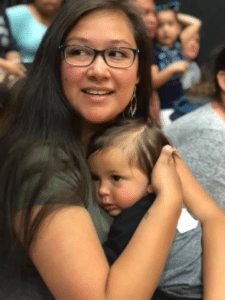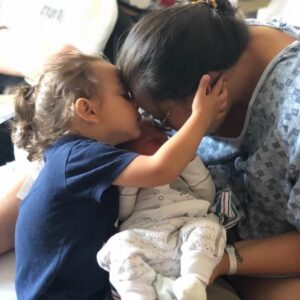Raising a child is one of life’s most pivotal roles. Parents often turn to each other for support during the critical stages of their child’s development, but not all parents have access to the resources they need.

For Alex, home visiting helped bridge the missing pieces of her Native heritage and supported her in reclaiming family traditions stripped from her through her great-grandfather’s U.S. Native boarding school experience.
Alex received home visiting services for the first time when she was pregnant with her oldest son, Mateo. But growing up, home visiting was already a part of her life as her mother was a tribal home visitor and a passionate advocate for early learning. Inspired by her mother, Alex felt she was destined to work in early learning, yet it wasn’t until motherhood that she intimately understood the precious rewards of home visiting support.

“Learning about the growth and development of my baby from my home visitor was fascinating! And that feeling like I’m succeeding as a first-time parent took me a long way.” Alex experienced a substantial shift in knowledge and confidence through her relationship with a home visitor; she was determined to support families in a similar way.
Bridging the Missing Pieces
The concept of home visiting is not new to Native families; Alex shared that home visiting is one of the most traditional things a Native family can do. Its critical process passes down knowledge and skills to preserve generational culture and heritage. In addition, home visiting creates a strong sense of community where the intrinsic needs of a child – during a foundational time in life – are addressed through trusted partnerships and shared goals.
Through home visiting, Alex established a special connection with local tribes as well as her own. Alex is an enrolled member of the Tlingit and Haida Indian Tribes of Alaska but lives and works in Washington state. Connecting with other members of the Haida Tribe and creating a sense of community was not easy so far away from Alaska. However, her home visitor was able to help connect her to local resources and inspire her to the place where she is now — celebrating her cultural heritage and reclaiming family traditions lost through her great-grandfather’s boarding school experience.
Native children were forcibly removed from their families and placed in government operated boarding schools between 1869 and the 1960s. The schools used “systematic militarized and identity-alteration methodologies,” to force white assimilation. They changed children’s names, cut long hair, and prohibited any use of Native languages and cultural practices — or else they faced brutal punishment. – “All the hurt and the rage: Elders recall trauma of Native boarding schools.”
Alex’s great-grandfather had 17 siblings. He was displaced from his family when he was taken to a boarding school – never to be reunited. As a result, her family lost a great deal of their cultural heritage and traditions; Alex knows very little about her native language, songs, dances, or traditional medicines because her great-grandfather was deprived of his cultural identity.
Instead of a rich sense of cultural identity, the historical trauma of Alex’s great-grandfather’s experiences were passed down through her aunts, uncles and mother. For Alex, home visiting support provided a way to heal from this generational pain by offering resources to traditional activities and connection to a shared community. Home visiting helped Alex find a new sense of hope and resiliency. In realizing that she was experiencing the collective intergenerational trauma of losing language, culture and identity, Alex now has a path forward for her family and tools to support other families experiencing generational trauma.

Alex’s great-grandfather, George Nix, was Alaska’s first professional football player (1926)
Near@Home is a great resource to help home visitors have difficult conversations, particularly when reflecting on times of trauma. When home visitors are equipped with tools to tackle difficult conversations, they can safely, respectfully and effectively discuss ACES (adverse childhood experiences), trauma, and other hard topics with parents by focusing on hope, respect and resilience.
Communities of Practice for Home Visitors
Communities of practice are another support Start Early Washington facilitates for home visiting professionals. Our community of practice, “Supporting Native Families,” aims to provide opportunities for professionals to understand tribal communities better and walk away with strategies and ideas to better serve Native families in Washington.
Washington state is home to 29 federally recognized tribes. Each tribal nation is uniquely different, including the size of the reservation, number of citizens and financial resources. Similarly, they each have unique cultural identifiers and shared experiences.
With this in mind, there’s a lot for home visitors to learn when engaging with Native families. Families feel more connected and appreciate when home visitors make the time to understand family culture and dynamics.

“I think all home visitors want to achieve that goal — to understand each member of the family. But when families know that someone wants to learn about their culture and identity, when someone takes an interest in what’s important to the family and genuinely supports the caregiver and child — that’s empowering.” – Alex
Visit our page to learn more about home visiting work in Washington and supports provided by Start Early Washington’s home visiting team.

